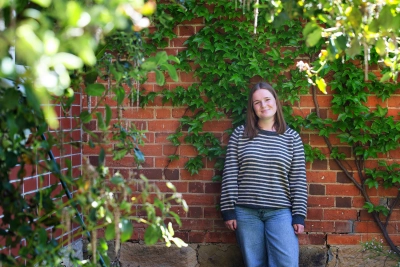
When Clancy left her family's broadacre cropping farm in the Riverina region of southern New South Wales, she wasn't just seeking an agricultural education; she was looking for something extraordinary. What she found at the University of Tasmania exceeded all expectations, offering a unique combination of academic diversity, hands-on learning, and a supportive home away from home at Jane.
Tasmania: Where Agricultural Diversity Thrives
Coming from a dry, hot area of mainland Australia, Clancy was immediately struck by Tasmania's agricultural uniqueness. "The agriculture down here is just so diverse," she explains. "You've got everything from viticulture to cropping to livestock and environmental management."
This diversity isn't just about variety, it's about opportunity. Tasmania's remarkable climate variations, from the moderate conditions of Hobart to the wet northwest coast, create an unparalleled learning environment.
"You can grow everything from wine grapes to avocados," Clancy notes. "There's also a lot of ag research coming out of Tasmania as well, which is pretty cool, like with Pyrethrum production and stuff with Botanical Resources Australia up in the northwest."
For students like Clancy, who grew up surrounded by cereal production and livestock management, Tasmania offers exposure to horticulture, viticulture, and innovative production systems that simply don't exist in many other parts of Australia.


"The diversity of it has been a huge benefit for me," she says. "Last year I had a week-long camp in the northwest just to see all the different production systems up there, which was really cool."
A Degree That Defies Expectations
One of the most remarkable aspects of agricultural science at the University of Tasmania is its flexibility and breadth. Clancy herself is pursuing a Bachelor of Agricultural Science combined with a Bachelor of Arts with an English writing major. She says the University of Tasmania is "one of the only universities in Australia that offers that specific degree and that combination.”
But the possibilities don't stop there.
"There's a lot of really cool degree combinations with Ag," Clancy explains. "You can do business combinations, even ancient history and agriculture." This flexibility reflects a crucial truth about modern agriculture: it's far more than muddy gumboots and manual labour.
"I think people don't really realise how diverse it is," Clancy observes. "There's so much innovation and development." From agricultural extension to finance, from plant science to environmental management, the pathways are limitless. "In this ever changing world where we're faced with lots of challenges, such as climate change, it's really important to have strategies and new methods on the way."


Breaking Stereotypes: A New Face of Agriculture
Perhaps one of the most encouraging developments in agricultural science at the University of Tasmania is its inclusivity. "I'd say over half the students are female, which is amazing just to see so many women in agriculture."
This shift represents a fundamental change in the industry. "I know traditionally it's been very male dominated, but I think these days there's so many women coming into agriculture and it's not all about manual labour," Clancy says. "There are other pathways and so many options for what you want to do."
The student body itself is remarkably diverse, with people from all over Australia bringing different perspectives.
"People from the mainland bring in a mainland perspective on agriculture," Clancy notes. But what truly unifies them is purpose: "Not everyone's from a farming background necessarily, but we all want the same thing, feeding the country. It's a really cool degree. You just feel very unified."


Jane: A Home for Growth
For a young woman moving from rural New South Wales to Tasmania with no family or friends in the state, finding the right living environment was crucial. Jane became that foundation for Clancy.
"This is my second year at Jane," she says. "Moving from the mainland, especially to a place where I didn't have any family or friends, Jane has turned into a home for me."
The benefits extend far beyond accommodation. "Just being able to move here and rely on people to look after me and feed me, I love that it is catered, having that support around has really helped me to be able to relax into uni and explore what I'm really interested in, while feeling safe and not having to stress too much about my living situation."

But perhaps most valuable are the connections. "It's been so amazing to connect with so many different people and make friends, especially with people from different backgrounds," Clancy reflects. This includes engaging with engineering students and others from industries connected to agriculture, leading to fascinating cross disciplinary discussions.
"I'm so glad I came here," she says with genuine warmth. "It's enabled me to follow my dreams."
A Future-Focused Career
For students worried about career prospects and economic uncertainty, agricultural science offers something invaluable: security and relevance.
"In this world where we're worried about the economy and the environment, agriculture is a really cool option because you know you have a job at the end of it, it's just in such high demand," Clancy explains.
Even better, agricultural degrees at the University of Tasmania are subsidised, reflecting the national need for qualified agricultural professionals. "They're just trying to get more and more people into it," she notes.
The career possibilities are genuinely exciting. Clancy has discovered her own interests evolving through her studies: "I've learned that I'm probably more interested in plant science and soil science rather than livestock science." She's also exploring agricultural journalism, inspired by Tasmanian author Maggie McKeller, and sees potential in agricultural media and communications.
"If you understand the ins and outs of agriculture, and the importance of it, and you can communicate effectively to different people," she says. In a world facing climate challenges and food security concerns, professionals who can bridge the gap between innovation and implementation are desperately needed.
Integrating Knowledge: Old and New
Clancy's relationship with her father, who also studied agriculture, exemplifies the dynamic nature of the field. "Dad and I have already had a lot of discussions about this," she shares. "My dad's very open-minded and he's looking to develop the farm.”
What she's learning at university often surprises even experienced farmers. "There's a lot of things I say and Dad's like, 'Oh, I haven't thought about that' – even looking at Indigenous perspectives of farming, we do a lot of that at UTAS, which is really special."


This integration of ancient and modern knowledge, combined with attention to sustainability, carbon neutrality, and environmental health, positions today's agricultural graduates as true change-makers.
"Agriculture is definitely a big centrepiece there," Clancy says of climate action. "It's all about integrating better practices because ultimately the farmers want their land in the best health."
The Bottom Line
For year 11 and 12 students facing that overwhelming question - "What do you want to do?" - Clancy has clear advice based on her own experience. "Agriculture sort of ticks the boxes for a lot of my issues and concerns," she says. "There are just so many pathways. You can do anything from business to animal science, plant science, environmental management, ag finance, there's just so many options."
Combined with the right support system, like that offered at Jane, and Tasmania's unique agricultural landscape, the University of Tasmania provides an exceptional environment for students to explore, grow, and prepare for meaningful careers.
"If you do have a bit of interest in benefitting the world, in being out in the environment and doing what's best, I think a career in agriculture is totally a good option," Clancy concludes.
For her, the combination of cutting-edge agricultural education and the supportive community at Jane has created the perfect foundation for whatever future she chooses, whether that's back on the family farm, in agricultural research, communications, or any of the countless pathways this remarkably diverse field offers.